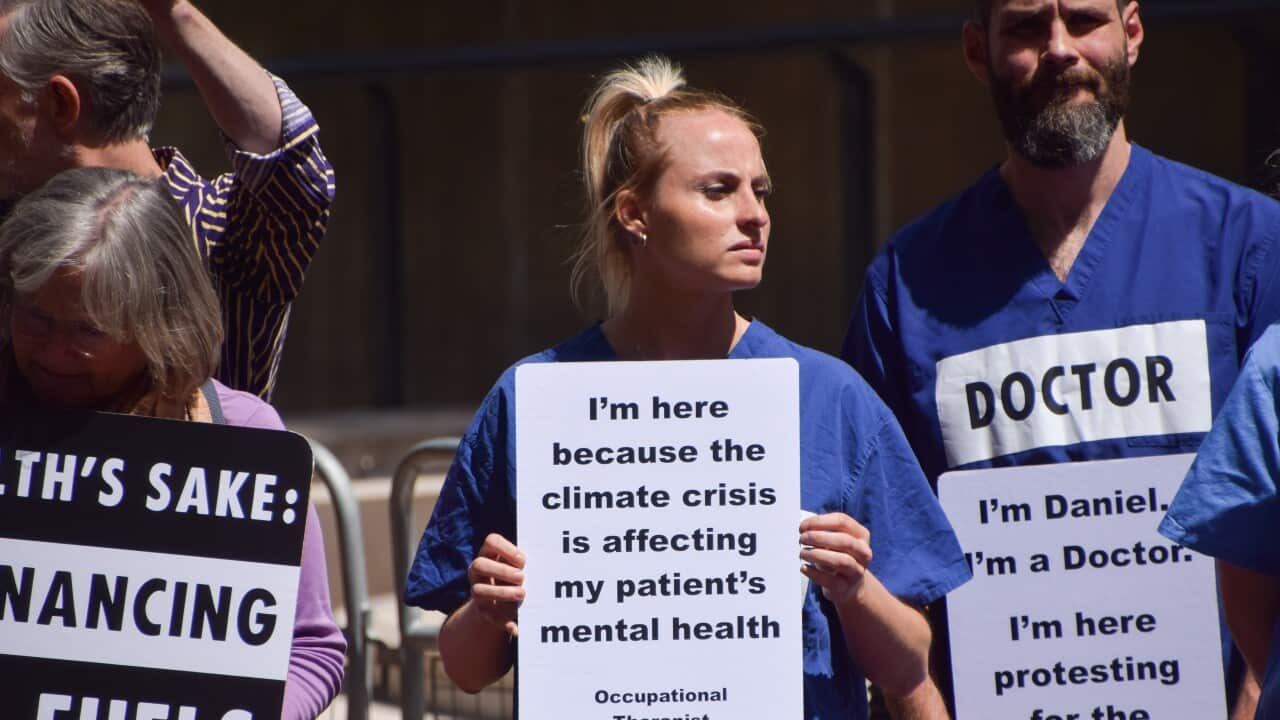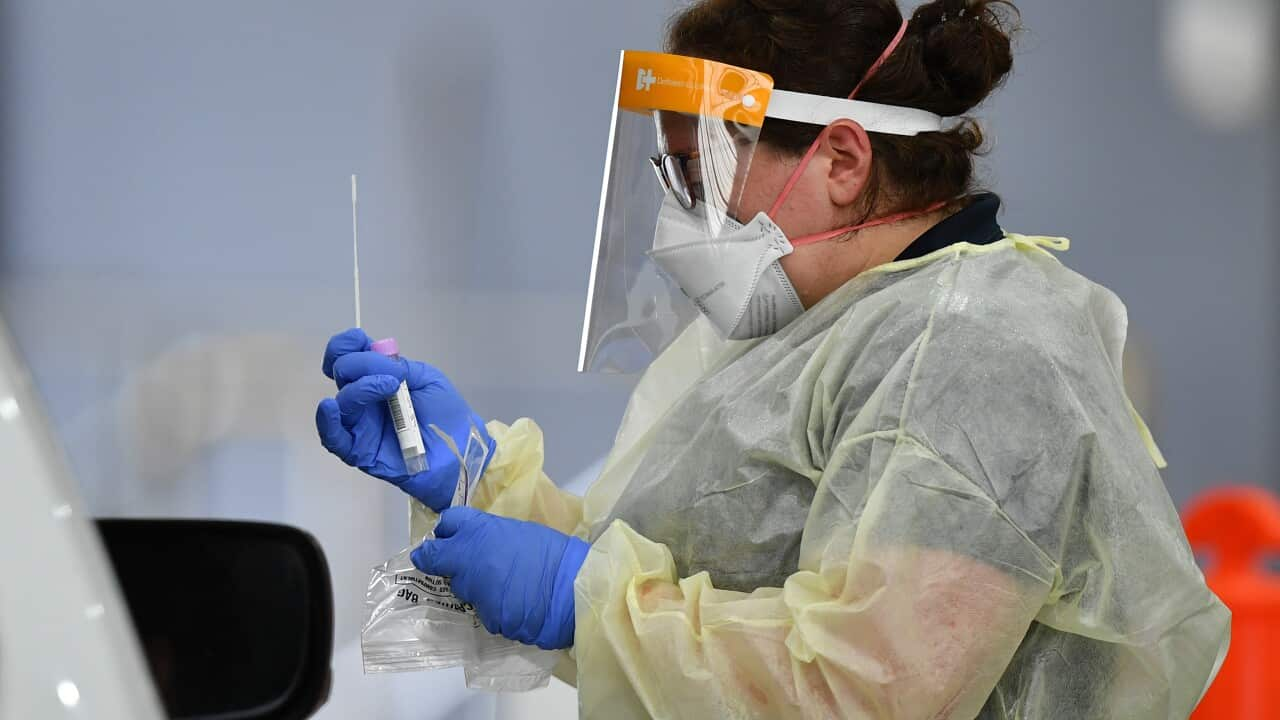As Australia's coronavirus-related death toll continues to rise, questions are being asked about when the nation will start to vaccinate children under the age of five, after the Centers for Disease Control and Prevention (CDC) in the United States approved the vaccines for children as young as six months.
The decision green lights a rollout across the US from this week.
It comes after there were more than 100 COVID-19-related fatalities announced over the weekend in Australia, including 48 in Victoria.
More than 47,000 new infections have also been recorded since Thursday.
There are presently more than 212,000 active COVID-19 cases across the country, with nearly 2,900 patients in hospital care.
When it comes to the US vaccine rollout among babies and young children, Associate Professor Dr Nicholas Wood at the University of Sydney Children’s Hospital Westmead Clinical School said Australia will be paying close attention.
"The safety will be very actively monitored for in the United States, so Australia will be able to watch the US experience. Parents before they vaccinate the kid will want to know, is it safe, how safe it is?
"They'll also want to know how effective the vaccine is. The vaccine trials weren't large enough to give a really good estimate of the vaccine effectiveness. So again, that will be looked for when it rolls out into the real world."
While COVID-19 is generally more mild in children, it has been the fifth-leading cause of deaths in children aged between one and four in the US, according to the CDC.
Moderna and Pifzer earlier this week made their pitch to the CDC panel to support vaccination in this age group, claiming their vaccines were safe.
"As children under four have had the greatest increase in their risk of hospitalisation due to COVID-19 during the Omicron surge, initiating this vaccination series now is vital to start protecting children this summer," Dr Jacqueline Miller, senior vice president of Infectious Diseases at Moderna said.
Vaccine side effects, including fever and fatigue, tend to be minor in children and less common than in adults.
In its clinical trials, Moderna found that two shots of its vaccine, each with one-quarter of the adult dose, was about 40 to 50 per cent effective in preventing mild infection.
The Pfizer-BioNTech vaccine also produced a strong immune response, but only after three doses.
Pfizer claims its shots, which are just one-tenth of the adult dose, have an overall efficacy of 80 per cent in children under five.
But that calculation is based off a sample size of just 10.
Dr Susan Wollersheim at the Food and Drug Administration Center for Biologics Evaluation and Research in the US said it would be challenging to make conclusions without more data.
"It's difficult really to make the comparisons between these two vaccines. So I would you know, I don't think we can really move there with the data that we have."
In Australia, the Therapeutic Goods Administration has begun its evaluation of an application from Moderna to extend the use of its COVID-19 vaccine to children aged six months to five years old.
Currently, this mRNA vaccine is provisionally approved in individuals aged six years and older and as a booster dose for adults aged 18 years and older.
A lower dose of the vaccine is being assessed for children aged between six months to five years old.
Dr Wood says bigger trial numbers will be needed before a final decision is made.
"The approach is either to do a larger clinical trial, or to roll out the vaccine into the community, and see, and then monitor the effectiveness from then on.
"I think, because of the fact that the US had 200 deaths in that young age group, and they were worried about children being admitted to hospital, they decided to roll out the vaccine, and based on pretty strong safety data from the vaccine trial.
"And the other thing that they can do is they look at the immune responses. So in this particular trials, they took a subgroup of kids and they did blood tests on them, and they looked for their COVID antibody responses. And the antibodies that the kids made was very much the same amount of antibody as was seen in the 18 to 25 year old so."
Dr Wood added that while preliminary trials indicate a good immune response in young children with vaccination, at this stage more real world data is needed to support this.
Pandemic 'clearly isn't over'
The weekend's virus statistics come after the federal government on Friday signed off on an extra $760 million to help states and territories fight the virus.
The existing cCmmonwealth-states funding deal was set to expire in September but was extended by three months.
Prime Minister Anthony Albanese said the pandemic "clearly isn't over yet and it would be very brave to suggest that you can make that projection".
Meanwhile, a new study points to ongoing brain fog and memory loss in long COVID patients with no improvement even after a year.
The Adapting to Pandemic Threats (ADAPT) research reveals nine in 10 long COVID sufferers were not taken to hospital when they originally caught the virus.
Experts say there is a "common misconception" that only people who have felt the full force of the virus develop long COVID.
St Vincent's Hospital's Professor Bruce Brew believes it may take another year to see an improvement in long COVID patients.
"The impact of long COVID on some is significant," he said.
"I had one patient, a businessman who had to sell his business because he could no longer focus on contracts and negotiations during meetings."
Steven Faux, who runs the long COVID clinic at St Vincent's, is seeing up to 10 new patients each week, with many younger people finding it difficult to continue working.
"We're seeing people with slow thought processes and confusion which is very similar to a traumatic brain injury," he said
Further information will be presented at the 8th National Brain Injury Conference at the University of Sydney which opens on Tuesday.
With AAP




